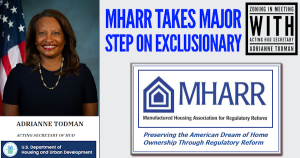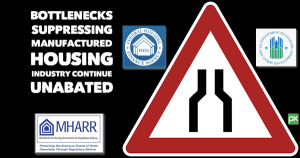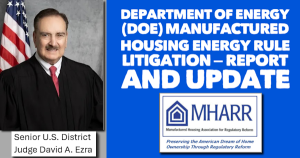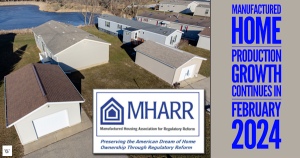‘FHFA has Repeatedly Reported Material Misrepresentations to Congress’ ‘Breach of Responsibilities under HERA Relating to DTS’
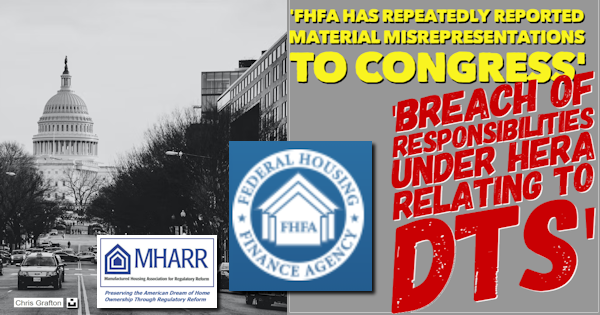
August 15, 2022
VIA ELECTRONIC SUBMISSION
Hon. Sandra Thompson
Director
Federal Housing Finance Agency
Constitution Center
400 7th Street, SW
Washington, D.C. 20219
Re: Duty to Serve Listening Session – Manufactured Housing (July 11, 2022)
Dear Ms. Thompson:
The following written comments, corresponding with my verbal presentation at the July 11, 2022 Duty to Serve Underserved Markets (DTS) Listening Session regarding the manufactured housing consumer finance market, are submitted on behalf of the Manufactured Housing Association for Regulatory Reform (MHARR). MHARR is a Washington, D.C.-based national trade organization representing the views and interests of manufactured housing producers. MHARR’s members are located in all regions of the United States.
MHARR has offered comments in many previous FHFA “listening sessions” related to the “Duty to Serve” and its manufactured housing component. Similarly, MHARR has submitted written comments on multiple occasions with respect to: (1) DTS generally; (2) proposed DTS “implementation” plans by Fannie Mae and Freddie Mac; and (3) proposed DTS plan revisions. In addition to these statements and comments, we have also met on multiple occasions with FHFA officials responsible for DTS and its implementation.
Those meetings have included both past FHFA directors, as well as the current Director. Indeed, we welcomed the opportunity to have Director Thompson engage directly with a group of MHARR member-manufacturers in 2020. Those meetings, we believe, provided significant factual support for the position that MHARR has espoused consistently since DTS was first enacted nearly 15 years ago.
In each such instance, MHARR has consistently maintained that DTS can only have a market-significant impact within the manufactured housing sector if it includes homes financed with personal property or “chattel” – based loans. Chattel loans, as U.S. Census Bureau data establishes, constitute nearly 80% of the total manufactured housing consumer finance market, and have comprised the vast majority of all manufactured home consumer loans on a consistent basis for many years.
Furthermore, because personal property loans do not include funds for the purchase of the land on which a home is situated, such loans, axiomatically, account for the largest proportion of the industry’s most affordable homes – homes that provide safe and decent housing for Americans at every income level at a fraction of the cost of site-built homes.
Yet, nearly 15 years after Congress declared that Fannie Mae and Freddie Mac were not serving the manufactured housing market and manufactured housing consumers as they should, and directed both Enterprises, as well as FHFA as their regulator, to begin serving that market in a significant and effective manner, the chattel financing sector of the manufactured housing market – the largest single component of that market by far– remains completely unserved.
The vast bulk of the manufactured housing consumer financing market has thus effectively been left untouched by DTS. Consequently, by any objective parameter, the failure of the Enterprises to serve the manufactured housing market has continued unabated regardless of DTS, and the DTS mandate, by definition, remains unfulfilled with respect to manufactured housing. This is, quite simply, unacceptable and demands a remedy – if not from FHFA, then from Congress. Moreover, reporting the contrary to Congress, as FHFA has repeatedly done, represents a material misrepresentation by the agency and a breach of its responsibilities under HERA relating to DTS.
At first, the excuse from Fannie Mae and Freddie Mac – which was accepted by FHFA – was that there was insufficient information and data regarding the performance of manufactured housing chattel loans to include them within DTS, even though Congress expressly envisioned and authorized their inclusion. (Thus making any parallel “examination” and/or “analysis” by the Enterprises superfluous.)
This delay, based on an ostensible lack of relevant market information, was despite the fact that multiple private lenders within the manufactured housing market obviously have been – and remain – profitable within the existing chattel-dominated market.
Based on this alleged lack of information and data, chattel “pilot” programs originally included in the Enterprises’ initial DTS plans were ultimately eliminated, again with FHFA’s acquiescence.
Subsequently, despite such loan performance data apparently being provided or becoming available, chattel loans continued to be excluded from the extended 2020-2021 DTS implementation plans filed – and accepted by FHFA.
And now, in the latest DTS plans, chattel loans are once again relegated – in Freddie Mac’s plan – to a small out-year “pilot” program, while they continue to be completely excluded from Fannie Mae’s plan altogether. Unfortunately, though, as we have seen before, programs included in the out-years of the Enterprises’ DTS plans, have a way of disappearing before they are ever implemented.
In point of fact, chattel “pilot programs” have been proposed by the Enterprises in multiple original and modified iterations of their respective DTS implementation plans, but have never come to fruition even once.
With new leadership at FHFA, this must change. If the Biden Administration is intent on fulfilling its pledge to advance housing and homeownership for all Americans, including low and lower-income families, then the DTS mandate must be met and fulfilled with respect to the inherently affordable manufactured housing financed through personal property loans.
In 2018, a team of scholars at the Urban Institute (UI), including now-Ginnie Mae President Alanna McCargo and former HUD official Edward Golding, found that “restrictive or unavailable financing” was one of the main impediments to the greater utilization of affordable manufactured housing. The same team, in a separately-published UI study, pointed out that appreciation rates for HUD Code manufactured homes and site-built homes “are actually similar after adjusting for geographic differences.” Put simply, if the Urban Institute team could reach these critical conclusions some four years ago, there is no legitimate reason to further delay programs at both Enterprises to provide market-significant support for manufactured home chattel lending. Such support is essential to the growth of the HUD Code market and to addressing the affordable housing shortage that President Biden has pledged to address and alleviate through, among other things, his Housing Action Supply Plan.
Instead of years’ more broken promises, FHFA and the Enterprises must act decisively now to implement DTS for all segments of the manufactured housing consumer finance market, including chattel loans for mainstream, affordable manufactured homes, in market-significant volumes.
Sincerely,
Mark Weiss
President and CEO
cc: Hon. Joseph R. Biden
Hon. Marcia Fudge
August 15, 2022
VIA ELECTRONIC SUBMISSION
Hon. Sandra Thompson
Director
Federal Housing Finance Agency
Constitution Center
400 7th Street, SW
Washington, D.C. 20219
Re: Duty to Serve Listening Session – Manufactured Housing (July 11, 2022)
Dear Ms. Thompson:
The following written comments, corresponding with my verbal presentation at the July 11, 2022 Duty to Serve Underserved Markets (DTS) Listening Session regarding the manufactured housing consumer finance market, are submitted on behalf of the Manufactured Housing Association for Regulatory Reform (MHARR). MHARR is a Washington, D.C.-based national trade organization representing the views and interests of manufactured housing producers. MHARR’s members are located in all regions of the United States.
MHARR has offered comments in many previous FHFA “listening sessions” related to the “Duty to Serve” and its manufactured housing component. Similarly, MHARR has submitted written comments on multiple occasions with respect to: (1) DTS generally; (2) proposed DTS “implementation” plans by Fannie Mae and Freddie Mac; and (3) proposed DTS plan revisions. In addition to these statements and comments, we have also met on multiple occasions with FHFA officials responsible for DTS and its implementation.
Those meetings have included both past FHFA directors, as well as the current Director. Indeed, we welcomed the opportunity to have Director Thompson engage directly with a group of MHARR member-manufacturers in 2020. Those meetings, we believe, provided significant factual support for the position that MHARR has espoused consistently since DTS was first enacted nearly 15 years ago.
In each such instance, MHARR has consistently maintained that DTS can only have a market-significant impact within the manufactured housing sector if it includes homes financed with personal property or “chattel” – based loans. Chattel loans, as U.S. Census Bureau data establishes, constitute nearly 80% of the total manufactured housing consumer finance market, and have comprised the vast majority of all manufactured home consumer loans on a consistent basis for many years.
Furthermore, because personal property loans do not include funds for the purchase of the land on which a home is situated, such loans, axiomatically, account for the largest proportion of the industry’s most affordable homes – homes that provide safe and decent housing for Americans at every income level at a fraction of the cost of site-built homes.
Yet, nearly 15 years after Congress declared that Fannie Mae and Freddie Mac were not serving the manufactured housing market and manufactured housing consumers as they should, and directed both Enterprises, as well as FHFA as their regulator, to begin serving that market in a significant and effective manner, the chattel financing sector of the manufactured housing market – the largest single component of that market by far– remains completely unserved.
The vast bulk of the manufactured housing consumer financing market has thus effectively been left untouched by DTS. Consequently, by any objective parameter, the failure of the Enterprises to serve the manufactured housing market has continued unabated regardless of DTS, and the DTS mandate, by definition, remains unfulfilled with respect to manufactured housing. This is, quite simply, unacceptable and demands a remedy – if not from FHFA, then from Congress. Moreover, reporting the contrary to Congress, as FHFA has repeatedly done, represents a material misrepresentation by the agency and a breach of its responsibilities under HERA relating to DTS.
At first, the excuse from Fannie Mae and Freddie Mac – which was accepted by FHFA – was that there was insufficient information and data regarding the performance of manufactured housing chattel loans to include them within DTS, even though Congress expressly envisioned and authorized their inclusion. (Thus making any parallel “examination” and/or “analysis” by the Enterprises superfluous.)
This delay, based on an ostensible lack of relevant market information, was despite the fact that multiple private lenders within the manufactured housing market obviously have been – and remain – profitable within the existing chattel-dominated market.
Based on this alleged lack of information and data, chattel “pilot” programs originally included in the Enterprises’ initial DTS plans were ultimately eliminated, again with FHFA’s acquiescence.
Subsequently, despite such loan performance data apparently being provided or becoming available, chattel loans continued to be excluded from the extended 2020-2021 DTS implementation plans filed – and accepted by FHFA.
And now, in the latest DTS plans, chattel loans are once again relegated – in Freddie Mac’s plan – to a small out-year “pilot” program, while they continue to be completely excluded from Fannie Mae’s plan altogether. Unfortunately, though, as we have seen before, programs included in the out-years of the Enterprises’ DTS plans, have a way of disappearing before they are ever implemented.
In point of fact, chattel “pilot programs” have been proposed by the Enterprises in multiple original and modified iterations of their respective DTS implementation plans, but have never come to fruition even once.
With new leadership at FHFA, this must change. If the Biden Administration is intent on fulfilling its pledge to advance housing and homeownership for all Americans, including low and lower-income families, then the DTS mandate must be met and fulfilled with respect to the inherently affordable manufactured housing financed through personal property loans.
In 2018, a team of scholars at the Urban Institute (UI), including now-Ginnie Mae President Alanna McCargo and former HUD official Edward Golding, found that “restrictive or unavailable financing” was one of the main impediments to the greater utilization of affordable manufactured housing. The same team, in a separately-published UI study, pointed out that appreciation rates for HUD Code manufactured homes and site-built homes “are actually similar after adjusting for geographic differences.” Put simply, if the Urban Institute team could reach these critical conclusions some four years ago, there is no legitimate reason to further delay programs at both Enterprises to provide market-significant support for manufactured home chattel lending. Such support is essential to the growth of the HUD Code market and to addressing the affordable housing shortage that President Biden has pledged to address and alleviate through, among other things, his Housing Action Supply Plan.
Instead of years’ more broken promises, FHFA and the Enterprises must act decisively now to implement DTS for all segments of the manufactured housing consumer finance market, including chattel loans for mainstream, affordable manufactured homes, in market-significant volumes.
Sincerely,
Mark Weiss
President and CEO
cc: Hon. Joseph R. Biden
Hon. Marcia Fudge





